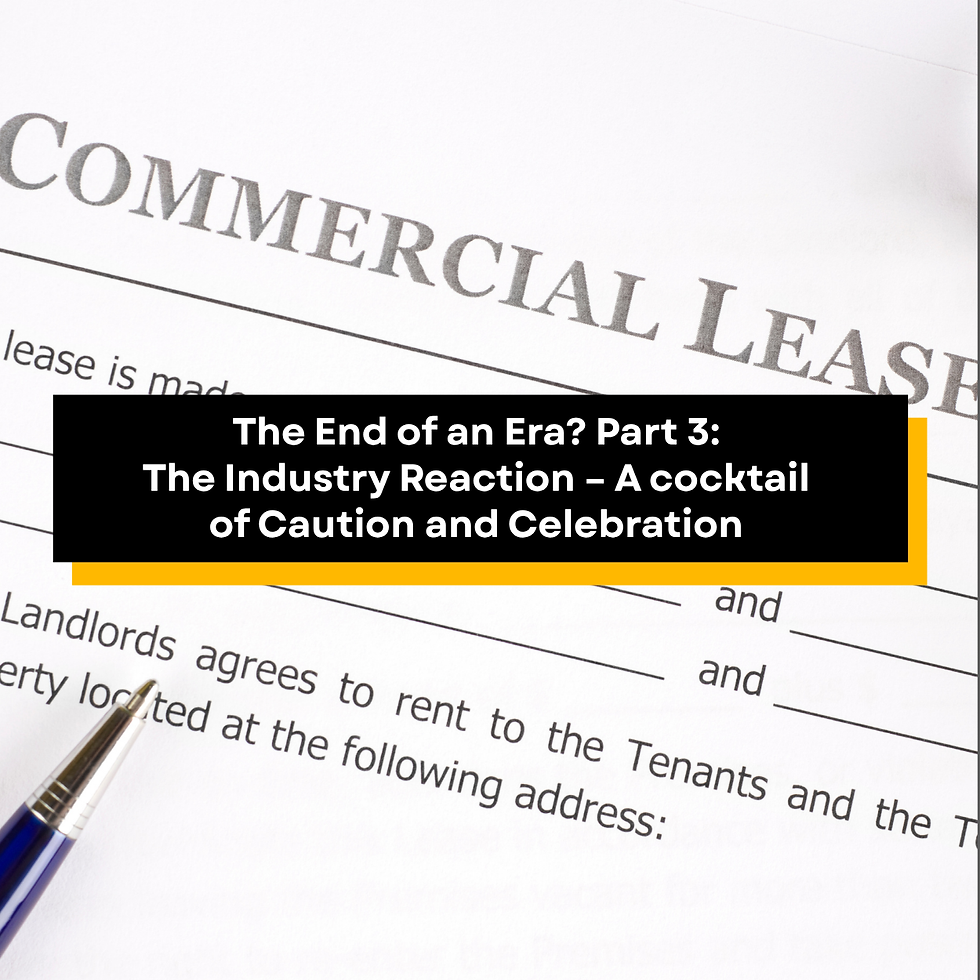The End of an Era? Part 3: The Industry Reaction – A cocktail of Caution and Celebration
- Rico Naylor
- Jul 17, 2025
- 2 min read
The government’s proposal to ban upward-only rent reviews (UORR) has sent shockwaves through the commercial property sector, not least because of the lack of prior consultation.
The unexpected announcement has drawn a spectrum of reactions, from sharp warnings about investor confidence to praise from tenant-focused groups.
The next part of our series examines the initial industry verdict and the key arguments that shape this critical debate.

The Investor's Warning: A Risk to Confidence and Viability
The dominant reaction from landlords and investors has been one of deep concern.
Melanie Leech, Chief Executive of the British Property Federation (BPF), described the move as "interference in long-established commercial leasing arrangements" that "risks investor confidence at a time when development viability is already seriously challenged".
This sentiment is echoed across the investment community, with fears that disrupting the predictable income streams that UORRs provide could undermine property values and deter institutional and overseas investment in UK commercial property.
The core argument is that UORRs are a standard feature that underpins long-term investment strategies and mortgage borrowing.
Removing them without consultation, some argue, is "irresponsible and ill-timed," particularly when the UK is actively seeking inward investment. The fear is that this could stall market activity and reduce the capital available for the very regeneration the UK needs.
A Lifeline for the High Street? The Tenant's Perspective
In stark contrast, organisations representing tenants have welcomed the proposal.
The Night Time Industries Association (NTIA) hailed the ban as a "landmark win for independent businesses" and a clear signal of intent to support the UK's struggling high streets.
Similarly, UKHospitality has long argued that "unjust upward-only rent review clauses" make rents unnecessarily expensive and constrain investment.
From this perspective, the ban is seen as a long-overdue measure to bring fairness and stability to commercial leasing. The hope is that it will protect businesses from unsustainable rent hikes during economic downturns, allowing them to survive and thrive, which in turn helps to reduce high street vacancies and supports local economies.
A Call for Clarity and Caution: The Professional View
Occupying a more neutral ground, professional bodies like RICS have called for a measured approach.
RICS acknowledges the strong views on both sides of the debate but highlights that the market has already evolved significantly, with lease terms becoming shorter and more flexible.
Their primary concern is that the Bill does not create "market uncertainty at a time when many businesses need confidence".
The focus for RICS is on promoting best practice, clarity, and transparency in leasing, rather than prescribing commercial outcomes.
This view suggests that while the intention behind the ban may be sound, the government should also focus on the wider adoption of professional standards to ensure a fair and equitable market for all parties.
As the Bill progresses, the industry will be watching closely to see how these divergent views shape the final legislation.



Comments